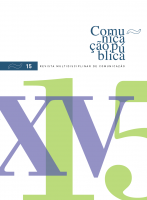Maria Teresa Horta journalist
professional path, memories and circumstances
DOI:
https://doi.org/10.4000/cp.635Keywords:
Maria Teresa Horta, journalism, feminism, gender, women’s magazinesAbstract
The present article aspires at reconstructing the journalistic career of Maria Teresa Horta, whose relevance is justified by the dimension of her literary legacy, along with the contribution given to the feminist movement in Portugal. Through an expository itinerary of her professional chronology, we will endeavour to unveil the context of her exercise of this profession, the editorial structures she was part of, her publications and her professional peers. Building from the professional narrative of the author of Minha Senhora de Mim, we will attempt to account for the specificities of different media structures and the challenges and problems Maria Teresa faced during the multiple decades that she practised journalism. To this end, we have created a fundamental separation in the text, between the period running up to the April 1974 Revolution and the period thereafter. Finally, we will aim to underline the gender dimension in the journalistic experience of Maria Teresa Horta.
Downloads
References
Azevedo, C. (1999) A Censura de Salazar e Marcelo Caetano – Imprensa, Teatro, Cinema, Televisão, Radiodifusão, Livro. Lisboa, Editorial Caminho.
Barreno, M.I., Horta, M.T., Costa, M.V; Amaral, A.L., (org.). (2010[1972]) Novas Cartas Portuguesas – Edição Anotada. Lisboa, Dom Quixote.
Cabrera, A. (2006) Marcello Caetano: Poder e Imprensa. Lisboa, Livros Horizonte.
Cantinho, M.J. (2004) À Conversa com Maria Teresa Horta. [internet] Disponível em: http://www.storm-magazine.com/novodb/arqmais.php?id=261&sec&secn [Consult. a 10 de Novembro 2013]
Correia, F., Baptista, C. (2007) Jornalistas. Do Ofício à Profissão. Mudanças no Jornalismo Português (1956-1968). Lisboa, Caminho.
Dias, A.S. (2013) Maria Teresa Horta. Eu sou a minha Poesia, in Ler, Novembro.
Fiadeiro, M.A. (2003) Maria Lamas – Biografia. Lisboa, Quetzal Editores.
Garcia, J. L. (org.), (2009) Estudos sobre os Jornalistas Portugueses. Metamorfoses e Encruzilhadas no Limiar do Século XXI. Lisboa, ICS.
Gomes, R. T. (1999). Da crítica aos críticos: as secções de livros como configuração do jornalismo cultural. Fórum Sociológico, 1/2: 181 - 201.
Gorjão, V. (2002) Mulheres em Tempos Sombrios. Oposição feminina ao Estado Novo. Lisboa, Imprensa de Ciências Sociais.
Neves, H., Calado, M. (2001) O Estado Novo e As Mulheres. O Género como Investimento Ideológico e de Mobilização. Lisboa, Biblioteca Museu República e Resistência.
Oliveira, A.F. (s.d.) Proíbem-me e eu incandesço, in Cadernos de Jornalismo da Universidade de Coimbra. [Internet] Disponível em: http://cadernosdejornalismo.uc.pt/00/14-18.pdf [Consult. a 10 de Novembro 2013]
Pimentel, I.F. (2011) A Cada Um O Seu Lugar. A Política Feminina no Estado Novo. Lisboa, Temas e Debates.
Ribeiro, A. M. (2014) Não aceitaria (um prémio) de ninguém deste Governo nem do Presidente da República, in WeekEnd, Jornal de Negócios, 11 de Abril de 2014.
Ricardo, D. (2009) ‘A Capital.’Contestação pelo Sensacionalismo. Clube de Jornalistas. [Internet] Disponível em: http://www.clubedejornalistas.pt/uploads/jj37/JJ37_53_Capital.pdf [Consult. a 10 de Novembro de 2013]
Subtil, F. (2009) Anotações sobre o Processo de Feminização da Profissão de Jornalista na Década de 1990. In José Luís Garcia, (org.). Estudos sobre os Jornalistas Portugueses. Metamorfoses e Encruzilhadas no Limiar do Século XXI. Lisboa, ICS: 93-108.
Tavares, M. (2011) Feminismos. Percursos e Desafios (1947-2007). Lisboa, Texto Editores.
Teles, V. (2005) Maria Teresa Horta. [Internet] Disponível em: http://www.viriatoteles.com/net/livros/contas-a-vida/maria-teresa-horta [Consult. a 10 de Novembro 2013]
Vasconcelos, H. (2012) A luz incandescente de Maria Teresa Horta. Ípsilon, Público. [Internet] Disponível em: http://ipsilon.publico.pt/livros/entrevista.aspx?id=302028 [Consult. a 10 de Novembro 2013]
Ventura, I. (2012) As Primeiras Mulheres Repórteres. Lisboa, Tinta-da-China.
Downloads
Published
Issue
Section
License
Copyright (c) 2014 Direitos do Autor (c) 2014

This work is licensed under a Creative Commons Attribution-NonCommercial 4.0 International License.
Os conteúdos da Comunicação Pública estão licenciados com uma licença Creative Commons - Atribuição-NãoComercial 4.0 Internacional.


